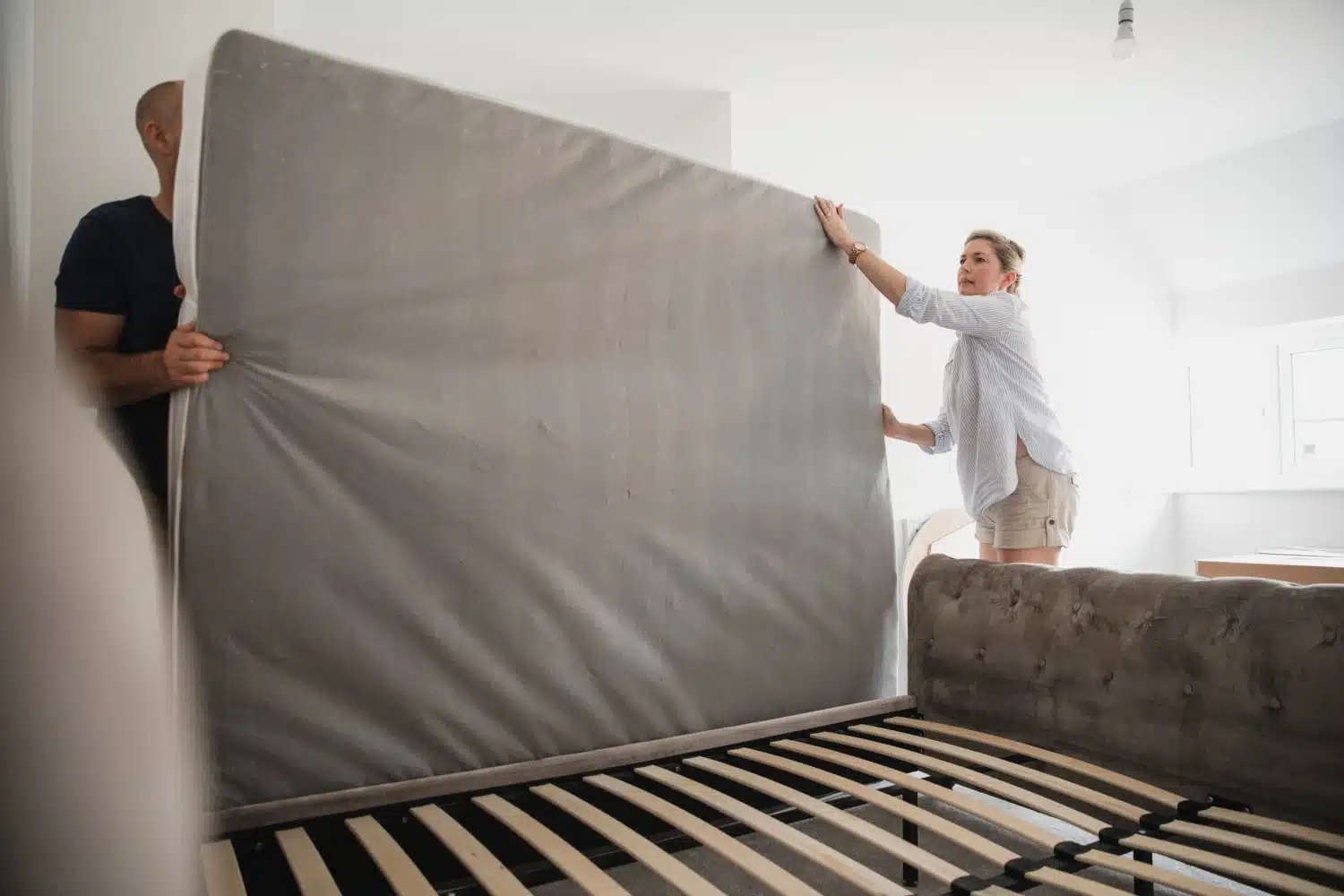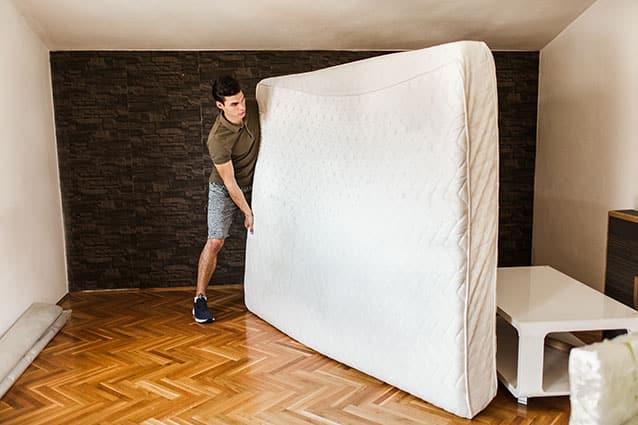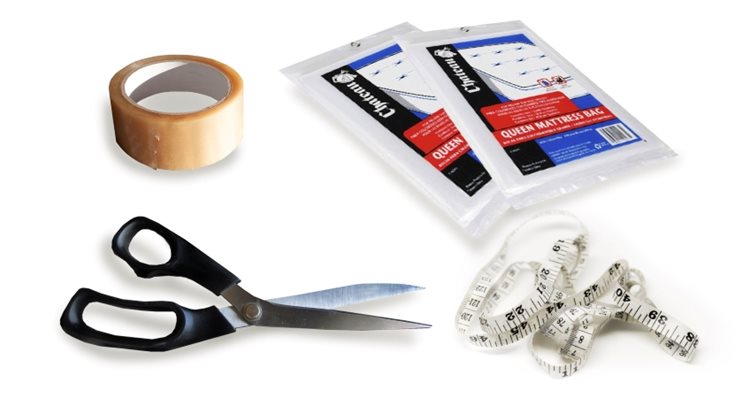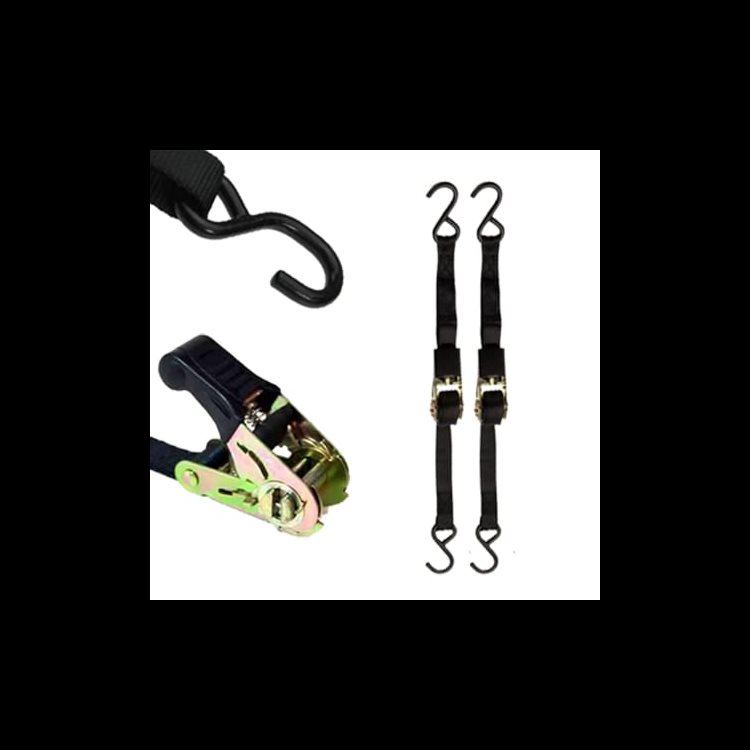
How to Move a Mattress Like a Pro: A Step-By-Step Guide
Moving Tips and Hacks
I’ll always remember when I became an expert on how to move a mattress. When I started my sophomore year of college, my mother bought me the mattress of my dreams. It was a gift she insisted on and referred to as an investment. Initially, I thought the idea was ridiculous. However, the joke’s on me because more than a decade after parting ways, I still daydream about that mattress — frequently. (No joke: My friends used to come over just to take naps on this mattress!)
It wasn’t long before the mattress became one of my must-keep items whenever I moved, whether I was packing and moving across town or full-on across the country. Whoever would have thought that moving a mattress would be such a priority? Anyone who’s ever cherished a good night’s sleep (ergo, your health), believes a great mattress is a worthy investment, or doesn’t have the extra budget for a brand new bed — that’s who.
Real talk: Moving a mattress isn’t always worth the hassle, but if you find yourself with a mattress that’s a keeper, here are our best tips on how to pack a mattress for moving — all while keeping it in stellar, sleep-worthy condition.
Moving a mattress requires some prep work before you get started, like measuring your space and gathering supplies.
How To Move a Mattress: A Step-By-Step Guide
Follow these eight steps on how to move a mattress easily, quickly, safely, and successfully.
Step 1: Measure Your Mattress.
Pull out your tape measure! When moving a mattress, it’s key to not only know the standard size — twin, double, full, queen, king — but also its exact dimensions. This will determine everything from the size of the mattress bag you’ll need to the best moving path, moving method, or storage space to use.Step 2: Gather All Your Supplies.
You’ll need things like mattress bags, moving tape, scissors, straps, or ropes to secure the mattress, and a mattress dolly. (We’ve included a detailed supply list below.)
Step 3: Make Sure There’s Enough Working Space.
Give yourself enough room to prepare for moving a mattress. Pro tip: Packing up your mattress last will help free up space in the room and give you something to sleep on until the night before your move.
Step 4: Enlist a Helping Hand (or Two).
Can you move a mattress by yourself? Even if you physically could, you shouldn’t! Mattresses are heavy, awkward, and love to flop around. If you’re trying to figure out how to move your mattress by yourself — don’t. Even professional movers use more than one person when moving mattresses. Instead, try to enlist the help of a friend, neighbor, or family member. You can also hire help through a freelance labor service like TaskRabbit or Handy, or get hourly professional moving help if you want specialists to take care of the heavy lifting.
Step 5: Place Your Clean Mattress in a Heavy-Duty Mattress Bag.
This will help protect your mattress — and keep it clean — during the move and if you’re putting it in storage. Moving mattress bags are sold in standard mattress sizes, but you’ll need to know the depth of your mattress to make sure the bag is big enough. They usually come in packages of two, so you can use one for your box springs, too.
Step 6: Clear a Path for Moving the Mattress.
Remove any breakables along the way, like lamps, hanging pictures, or anything else that could possibly be a casualty in the face of a wobbly mattress.
Step 7: Flip the Mattress on Its Side So It’s Easier To Move.
Wondering how to move mattresses when you’re working with lower ceiling heights, narrow doors, and/or stairs (a.k.a. 99 percent of movers)? Usually, this means flipping it horizontally so the mattress is longer than it is tall. It’s rare to be able to move a flat-positioned mattress, especially since you’ll likely have to go through doorways.
| Q: How do you move a mattress without professional movers? A: The best way to move a mattress without professional movers is for two people to turn the mattress on its side with each person holding the corner of an end. |
Step 8: Use the Mattress To Fill Any Empty Space.
A mattress’s shape is one of its biggest advantages — it can fit in thin spaces with ease! Leave a narrow space between your stuff and the wall of the container, then slip your mattress into it by standing it on its side. This guarantees easy access when you get to your new home — and the faster you unload, the sooner you get to take a power nap.
Note: Only do this if you plan to unload quickly. If you leave the mattress standing horizontally for a month or so, it will come out warped. If you need to leave your mattress in storage for a while, place it flat on top of a solid surface. This will keep it from deforming over time.
Step 9: Load and Secure the Mattress.
A mattress’s shape is one of its biggest advantages — it can fit in thin spaces with ease! Leave a narrow space between your stuff and the wall of the container, then slip your mattress into it by standing it on its side. This guarantees easy access when you get to your new home — and the faster you unload, the sooner you get to take a power nap.
Note: Only do this if you plan to unload quickly. If you leave the mattress standing horizontally for a month or so, it will come out warped. If you need to leave your mattress in storage for a while, place it flat on top of a solid surface. This will keep it from deforming over time.
Traditional Innerspring or Encased-Coil Mattress
Position on its side length-wise or flat, on top of a flat surface (in the same position as for sleeping), with nothing on top.
Memory Foam or Hybrid Mattress
Position flat, on top of a flat surface, with nothing on top of it.
Box Springs
Can be positioned flat or on the side, with nothing on top (unless it’s the mattress).

The most common positioning for moving a mattress around a home is to turn it on its side vertically rather than picking it up horizontally.
How To Move a Mattress: Dealing With Different Transportation Methods
Moving Trucks, Portable Containers, and Cargo Vans (for Moving Only)
Load the mattress on its side lengthwise, using an interior wall of the vehicle or container for support. Use rope or ratchet straps to secure the mattress in place. PODS containers, most moving trucks, and cargo vans have built-in tie-down handles, which make this a cinch. You can also pack in furniture or heavy boxes on the exposed side for extra support. Avoid putting anything on top of the mattress, though.
Cars and SUVs
Now, let’s address how to transport a full-size mattress or smaller twin. These smaller-sized mattresses may actually fit inside a passenger van or large SUV, if you take out the seats. To find out if yours will fit, remove the seats and measure the cargo space against the dimensions of your mattress. You can also strap most mattresses to the top of a car, but this is the riskiest option, and I don’t recommend it. It’s extremely hard to secure the mattress and can cause damage to your mattress or car — or worse, an accident.
If this is your only option, cars and SUVs with flat roofs and roof racks are the way to go. Place the mattress on the roof and secure it by tying it directly to the roof racks. Do this in as many places as possible to really anchor the mattress to the top of the car.
Storage Containers or Units
If you’ll be storing the mattress in a storage unit or storage container, be sure to place it flat and avoid putting anything on top. If a mattress is stored on its side for an extended period of time, it can damage the internal integrity and shorten the life of the mattress.
| Q: How do you compress a mattress for moving? A: You can compress a memory foam mattress for moving by putting it in a vacuum bag and removing the air with a vacuum. However, DIY mattress compression can damage the mattress, cause it to lose support, or make it lose its shape entirely. Also, if your mattress is an innerspring or hybrid, compression can damage the coils. No matter what, if you’re looking for tips on how to move a mattress when you’re tight on space, just be sure to never fold the mattress, as it may compromise the integrity of the item. |

Think you can pick up a mattress and load it right into a truck? Think again. You’ll need supplies to get the job done right.
How To Move a Mattress: Supplies You'll Need
Here’s a handy breakdown of all the essential items you’ll need to make moving a mattress a success.
Mattress Bag
A mattress bag is basically a huge, mattress-sized plastic bag that will help keep your mattress clean and dry during your move. Since these can sometimes rip during the moving process, I like to double bag my mattress and box springs for extra protection. Be sure to buy the right size mattress bag, especially when it comes to depth. To measure depth, just lay your mattress flat on the floor and use a tape measure or ruler to measure how far off the ground it is. For reference, a typical mattress is between 8-14 inches thick. When in doubt, go with the larger-sized mattress bag.
Moving Tape
If you’re in the process of moving, you should have a healthy supply of tape on hand. This will come in handy after you’ve placed your mattress inside the plastic moving mattress bag and need to seal it all up.
Scissors
Some folks will recommend using a box cutter to get your mattress out of the mattress bag, but I’ve found out the hard way that box cutters make it way too easy to accidentally slice through your moving mattress bag and ruin your mattress. Scissors are a safer bet when moving a mattress.

Ratchet straps are a necessary addition to your “How to Pack a Mattress for Moving” checklist.
Rope or Ratchet Straps
Once you get your mattress out of your house or apartment, you’ll want to use either rope or ratchet straps to secure it inside your chosen moving vehicle. Ratchet straps — also known as tie-down straps — are thick straps with hardware fasteners that are specifically made to secure cargo in place. Grab a few more than you think you’ll need, just in case the bed ends up being bigger than you estimated and you need to extend the length of the ratchet straps by hooking on some extra straps. If you’re using rope, get a thick, industrial-grade rope — and completely skip those bungee cords that can give too much, which results in an unsafe, unsecured mattress.
Furniture Dolly (Optional)
We don’t want to call out anyone’s strength, but if you’re wondering how to move a mattress when neither you nor your moving buddies can lift or navigate heavy items, It’s perfectly fine to hack your way through the actual process of physically moving a mattress.
For starters, you can either push it along or rest it on top of a large piece of cardboard, but it’s easier to use a dolly. While a mattress dolly is ideal — it comes with a sturdy slot to keep your mattress in position — rentals can be hard to find. You can opt for renting a four-wheel furniture dolly instead and use it to help move other household items and heavy boxes.
Before moving a mattress, you’ll want to take careful measurements to ensure you have enough space to transport and store it.
How To Move a Mattress: Taking Measurements
While the standardized mattress size can help you understand the general size of your mattress, the exact measurements can vary among makers, so it’s important to measure your mattress. You’ll want to measure it for length, width, and depth (thickness).
Length: The longest side of the mattress. When lying down, this is the side that runs from your head to your toes.
Width: The shorter part of the mattress.
Depth: Another term for the thickness of your mattress. A typical mattress is between 8 and 14 inches thick.
You’ll want to make sure you clean your mattress before and after you put it in storage.
How To Move a Mattress: Storage Dos and Don’ts
We tend to not think much about our mattresses beyond whether or not they are holding up their end of the bargain when we sleep. However, as it turns out, there are rules on how to store a mattress properly.
DO Clean Your Mattress Before and After You Put It in storage.
How do you move mattresses that are headed straight for storage? It’s going to take some prep work. Vacuum all sides, use an upholstery cleaner or disinfectant spray, and then let it thoroughly air dry. (Here’s a handy step-by-step guide on how to deep clean a mattress.)
DO Use Storage Mattress Bags To Store Your Mattress.
Actually, you can just keep your mattress and box springs in the protective plastic mattress bag you used for moving. It helps save a few steps while also providing extra protection from dust and other possible contaminants while in storage. The important thing is to make sure the mattress is entirely dry before you cover it, and then make sure it’s well sealed inside the cover.
DON’T Store Your Mattress on Its Side.
We can’t stress this enough: Side-storing a mattress can compromise its interior integrity and ruin the mattress — regardless of if it is a spring, foam, gel, or hybrid style. I found this out the hard way after storing a wonderful, all-foam Tuft & Needle mattress (and putting things on top) for two years. It was never the same. If you must store it on its side, try to rotate its position every 30 days or so.
DON’T Expose Your Mattress to Extreme Temperatures or Humidity.
High heat, freezing temperatures, and moisture can affect your mattress. For this reason, you should avoid storing your mattress in an attic, basement, or garage. If you’re using a storage facility, ask about the temperature range and humidity control.
DON’T Store Anything on Top of the Mattress.
This can cause your mattress to become misshapen and ruin its structural integrity.
Additionally, for anyone curious about how to move or store a mattress topper, here’s some good news: It’s a lot easier. Just roll it up tightly, wrap it in plastic and tape, and toss it in the storage unit or pack it in a box alongside your linens.
With PODS, You Can Move Your Mattress — And the Rest of Your Things, Too
When you look at a breakdown of how to move a mattress, you may realize it’s more work than you can manage. Here’s a quick summary:Step 1: Measure the mattress and choose a moving path.
Step 2: Gather mattress bags, tape, scissors, and ropes or straps.
Step 3: Prep your working space.
Step 4: See if some brawny friends or family can pitch in.
Step 5: Put your mattress in a heavy-duty mattress bag.
Step 6: Remove any objects or breakables in your path.
Step 7: Flip the mattress on its side.
Step 8: Place the mattress in a thin space in your moving truck or container.
Step 9: Load and secure the mattress.
If you’d like to leave the job to the professionals, PODS can refer you to local packing and loading help so you can focus on packing and loading less-cumbersome household items — or getting settled into your new home.
At the end of the day, moving a mattress can be hard work, but doing it right is well worth it. Once your head hits the pillow on your favorite bed in your new home, you’ll know it was worth every second and any second-guessing.
Alex Keight is a freelance writer based in Los Angeles who has moved 20+ times because she loves to experience new places.
Related Articles
Comments
Leave a Comment
Your email address will not be published. Required fields are marked *
